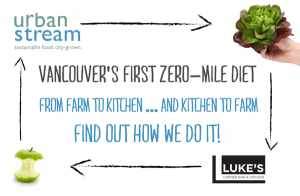Zero-Mile Diet?
I’m sure we’re all familiar with the “100-mile diet” concept, where the local concept of food is embraced by sourcing ingredients from suppliers and producers within 100 miles (more or less). There’s no doubt that Vancouver restaurants have adopted this mindset when it comes to featuring locally sourced ingredients on their menu. But what about the Zero Mile Diet? I came across this new concept (or at least one interpretation of it) when I read this article in the Vancouver Sun (online mind you—how sustainable!)
The article introduces Urban Stream Innovation, a Vancouver-based sustainable tech firm that has designed a prototype composter and vertical growing system. The prototype is designed to eliminate kitchen waste, while producing quality herbs and greens through a micro-farming system. So for example, a restaurant will hand off their “waste”, like vegetable scraps and old coffee grounds, to Urban Stream, who will then turn that waste into a nutritious solution that goes towards growing an abundant crop of greens, which the restaurant can purchase at a fair price. Talk about cradle-to-cradle reform!
For some skeptics, this may seem a bit too small scale at first glance, but at least it’s a step in the right direction. Urban Stream is one solution to the city’s upcoming composting reforms. You see, food waste will be banned from Vancouver landfills by 2015, which, when you think about it, is going to cause massive problems for the city’s thousands of restaurants.
Furthermore, Urban Stream not only gives restaurant access to local greens (and in the future, possibly a wider range of produce), but it also diverts a significant portion of waste away from paid-for disposal services. As a result, there is an opportunity for major savings in terms of disposing waste (with optimists in the article stating they’d like to work the cost of waste disposal down to $0 altogether). This really reinforces the concept of the triple bottom line, and makes a case for sustainability as an attractive/necessary component to a company’s cost structure, particularly in the food industry. The cost savings element also creates an incentive for restaurants to adopt such sustainable behaviour. Once more restaurants, particularly the popular chains in the city, take part in similar composting programs, the behaviour will be considered a social norm in the industry.
So, you can add Urban Stream to the growing list of Vancouver-based startups trying to give solutions for other businesses to go green!
